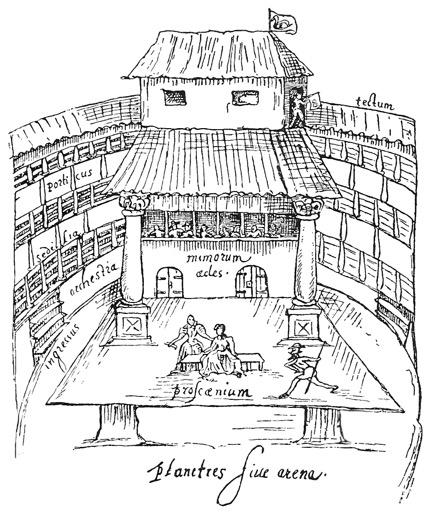Drauma

A 1596 sketch of a rehearsal in progress on the thrust stage of The Swan, a typical circular Elizabethan open-roof playhouse
"We somehow seem to stumble into happy accidents, anyway."
Any change, even HeadingHomeward, will most likely introduce both some drama and at least a little trauma into a life: Drauma. My father forever wondered why people could not just leave well enough alone, for he'd come up through a Dramatic childhood. Then he married my mother who, though perhaps not at first a fully fledged drama queen, at the very least certainly qualified as a drama princess. Full queenship followed. He never escaped the sturm und drang, however much he might have preferred an alternate experience. There was always, always, always something threatening domestic tranquility, though, gratefully, usually little more than minor soap opera productions. He'd just be settling in for the evening, kids finally on the way to bed, when my mom's cousin would stop by to see his favorite cousin BonBon, upset the stabile force field, and maybe fall off the front porch in the process. My dad despised upsets though he never managed to shake their intrusion.
I'm little different. I much prefer the old status quo which, if only because of its aging status can never hold on for nearly long enough to fully satisfy me. I prefer to hunker rather than assert myself out and into the world. Of course, The Muse prefers new beginnings, for she quickly grows bored with the known world and seeks fresh adventure once she's settled in. None of us being an island, each move nudges others off their spots, too, and Drauma inevitably ensues. Life seems troublingly similar to a Rubic's Cube. I readily admit that I'm no master. I'd rather let sleeping cats lie. Try as I might, I cannot slow the world's turning, though, and not even the tritest metaphor prevents any inevitable. We're HeadingHomeward, an act inevitably displacing our renters—The Muse's son, his partner, and our granddaughter (The GrandOther)—out of their home and into a far less certain future. Though we were careful to frame their tenancy in proper legalese, complete with signed agreement with actual clauses, still, sending that certified letter announcing our imminent return felt far from leaving well enough alone.
Heading anywhere seems to insist upon displacing the space surrounding us. We attempt to move through a surprising solid. I sense the headwind and expect disappointing gas mileage. Winds of misfortune buffet our passage. The Muse pulled up the ever-lengthening to-do list yesterday afternoon after that uncomfortable telephone conversation which failed to calm anything, the call concluding not so much as a coordination but a ticking time bomb. We bargained, seeking certainty where only broad strategy could sprout, too many details unknowable at the moment. Preconceptions crumbling, we could only share our preferences and try to not cast ourselves in the role of anyone's valiant saviors, not even our own. HeadingHomeward requires a period of abject homelessness which, too, shall eventually pass. We left The Villa a dozen springs ago and headed out into a world utterly unprepared for us. We were no better prepared for it. I hopelessly wandered for weeks learning the streets and neighborhoods before we quite literally stumbled into a place which had been seemingly waiting just for us, an unlikely but welcome convergence. We've lived like that since.
The moment of displacement, after the less extreme alternatives fail, should properly feel like a little death. With another act pending, that mid-play Drauma seems likely to be the end of the story. Even if the butler does it, everyone in the audience rightly feels at least a little complicit. We'd have to be inhuman to not relate to the misfortune we witness, especially when it was us who helped initiate it by buying that damned ticket. The playwright's playing us, though, and the actors, even the fresh corpse, are in on the ruse. The victim will recover before the next performance and the mystery will seem to have resolved itself before we exit, and we'll leave feeling refreshed for the experience. We will return. We exclusively live through the benevolent auspices of happy accidents, though few contexts initially seem very cheerful. Anyone imbedded within any Drauma rightly feels fearful, for this universe seems anything like consistently caring. Resolution emerges from rough passages, with benevolence properly not appearing in the first or even the second act. Near the end of the third act, when the plot threatens to thicken into stone, then these mysteries end. Whether it ends as expected, probably not the point of any performance.
The first night we were in that place we found to end our displacement for then, someone broke into our new home, broke a window screen and swiped a hundred bucks off a dresser in the room The Muse and I were sleeping in. The next morning, we rightly wondered what sort of salvation we'd found for ourselves, with deep twinges of longing remaining for that home in which we'd once felt so secure living. Over the rainbow and right off the end of our previously known world, we eventually found our spot there, too, and we were not in any way prepared when that landlord decided to sell that place right out from under our existence. We were forced to seek that force again, the only one capable of calming genuine Drauma with the unanticipated kindness of former strangers and mere unlikely happy accidents. Some current strangers seem destined to become life long friends. Drauma only pretends to portray real life. While we, too, muddle through on unlikely plot twists, real life's ooodles subtler and enlists no real actors, producing more compelling performances. We somehow seem to stumble into happy accidents, anyway.
©2021 by David A. Schmaltz - all rights reserved


